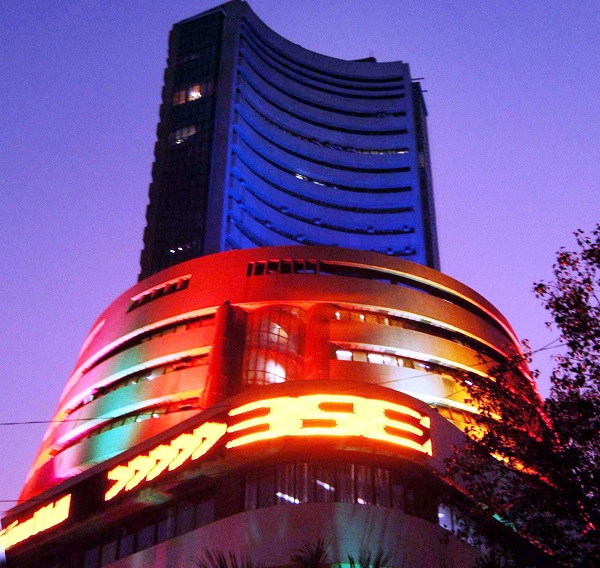 Mumbai:(IANS) Volatility prevailed in the Indian equities markets on Wednesday with negative cues from the Asian exchanges continuing to dampen investor sentiment and leading a barometer index to shed 219 points during the late-afternoon trade session.
Mumbai:(IANS) Volatility prevailed in the Indian equities markets on Wednesday with negative cues from the Asian exchanges continuing to dampen investor sentiment and leading a barometer index to shed 219 points during the late-afternoon trade session.
The barometer 30-scrip sensitive index (Sensex) of the Bombay Stock Exchange (BSE) was trading 219.49 points or 0.85 percent down (at 3.00 p.m.).
Bearish sentiments also dented investors’ confidence at the wider 50-scrip Nifty of the National Stock Exchange (NSE). The CNX Nifty was trading 60.20 points or 0.77 percent down at 7,725.65 points.
The S&P BSE Sensex, which opened at 25,891.95 points, was trading at 25,476.95 points during the late-afternoon session — lower by 219.49 points or 0.85 percent from the previous day’s close at 25,696.44 points.
The Sensex touched a high of 25,939.37 points and a low of 25,459.09 points in the intra-day trade so far.
Analysts observed that the initial gains of over 240 points came on the back of the government’s decision — announced by Finance Minister Arun Jaitley on Tuesday — that minimum alternate tax (MAT) will not be imposed on foreign portfolio and institutional investors.
“The Indian markets made initial gains after the government accepted Justice A.P. Shah Committee report ending the uncertainty on the applicability of MAT on foreign investors,” Vaibhav Agrawal, vice president, research, Angel Broking told IANS.
“This helped soothe frayed nerves of FIIs and is positive for the markets.”
Notwithstaning the positive announcements on MAT, the initial gains receded on account of continued weakness in the Asian markets coupled with less-than-expected macro data.
“The high intra-day volatility was caused due to the bearish cues coming in from the Asian markets. Investors are nervous about the evolving situation in China,” Anand James, co-head, technical research, Geojit BNP Paribas, told IANS.
As per James, volatility is also being flared-up due to expectations of new measures by the Chinese government and central bank to stabilise their markets. This in turn will further put pressure on the yuan and subsequently on the rupee value.
The massive implosion in the Chinese markets which has by some estimates eroded 40-45 percent of the entire stock value coupled with yuan devaluation and lower factory out has spooked the world markets.
“Oil prices are also a cause of worry. As they rose exponentially by around $10 in the last 3 days or so. Sentiments are also dampened — as investors make sense of the slowdown in the growth, purchasing mangers index (PMI) and eight core industries (ECI),” James added.
The Q1 GDP came in at 7 percent, showing signs of slowing vis-a-vis the 7.5 percent expansion during the previous quarter.
The ECI for select factory output slowed to 1.1 percent growth in July from an increase of 3 percent in the previous month.
The Nikkei India Manufacturing PMI (Purchasing Manufacturers Index) for the last month stood at 52.3 which is marginally down from July’s 52.7.
Sector-wise, S&P BSE banking, automobile, capital goods, consumer durables and oil and gas indices came under intense selling pressure.
The S&P BSE banking index plunged by 369.82 points, the capital goods index receded by 281.05 points, the automobile index contracted by 216.84 points, the consumer durables index declined by 128.79 points, the oil and gas index decreased by 104.55 points and healthcare index edged lower by 102.75 points.
However, information technology (IT) index augmented by 125.83 points, technology, entertainment and media (TECK) index gained by 54.83 points and fast moving consumer goods (FMCG) index rose by 47.82 points.





0 Comments